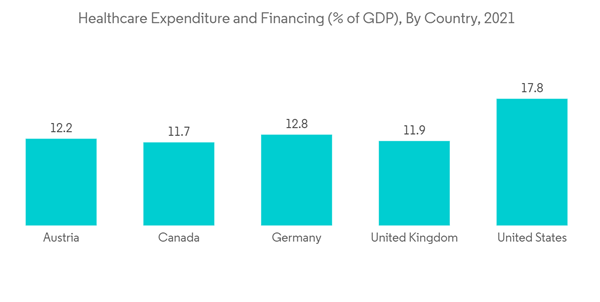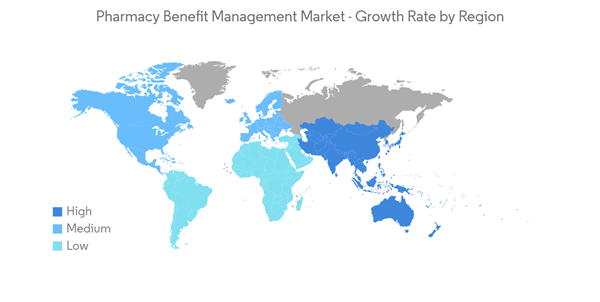Key Highlights
- COVID-19 impacted the growth of the pharmacy benefit management market. According to an article published in Research in Social and Administrative Pharmacy, in January 2021, due to the rise in demand for different pharmaceuticals, especially prescription drugs such as metformin, omeprazole, and others, hospitals have faced difficulties in personnel, drug supply, and pharmaceutical care. Also, the companies providing a diversified array of pharmacy care services have reported a significant increase in their revenue.
- For instance, as per the 2021 Annual Report, the revenue of Optum Inc. from Optum RX (a full-service prescription drug benefit provide) with a broad network of retail chains and independent pharmacies) was USD 91,314 million in 2021, with an increase of 4%, as compared to USD 87,498 million in 2020. Thus, the adoption of PBM solutions may increase over the years due to the benefits observed during the pandemic.
- The rising inclination towards pharmacy benefits management increases the accuracy, improves the safety and efficiency of the pharmacy store as well as improves patient health outcomes. This is anticipated to fuel the market growth over the forecast period.
- For instance, in March 2022, Elixir, the pharmacy benefit manager (PBM) division of Rite Aid, revealed its membership in the Pharmaceutical Care Management Association (PCMA). The addition of Elixir to PCMA boosts patients' access to affordable prescription drugs. Thus, the growing demand for pharmacy benefit management services among drug manufacturers, retail pharmacies, and health insurance providers is expected to fuel the market growth over the forecast period.
- The increase in the number of persons utilizing insurance to deal with the rise in medical costs, such as paying for treatment, hospitalization, health check-up, and hospitalization charges. Additionally, PBM combines medical and pharmaceutical products to support end-to-end healthcare solutions that enable the insurers to have comprehensive information about the patients, which enables the insurers to offer patients effective programs. This is also expected to fuel the demand for pharmacy benefit management systems, hence bolstering market growth.
- Furthermore, the rising health spending across the globe is expected to increase the adoption of technologically advanced software and solutions to monitor the inventory and supply of drugs as well as provide affordable medications to patients. This is anticipated to augment the market growth over the forecast period. For instance, according to the 2021 data published by the Centers for Medicare and Medicaid Services, the National Health Service increased by 2.7% to USD 4.3 trillion in 2021 (USD 12,914 per person), which accounted for 18.3% of GDP. In addition, as per the same source, private health insurance spending increased by 5.8% to USD 1,211.4 billion in 2021, and prescription drug spending increased by 7.8% to USD 378 billion in 2021.
- Moreover, the rising company activities in developing advanced software and solutions are also contributing to market growth. For instance, in February 2022, Optum launched Optum Specialty Fusion, a specialty medication management solution, to simplify care for patients with complex conditions and lower the cost of expensive specialty drugs. Specialized Fusion offers payers and providers of healthcare real-time insight into the most efficient specialty treatments at the patient's lowest cost by utilizing Optum's data and clinical experience. Therefore, owing to the factors such as growing health expenditure and increasing demand for prescription drugs, the studied market is expected to grow over the forecast period. However, the reluctance to adopt pharmacy automation systems and stringent regulatory processes on confidentiality are likely to hinder the growth of the pharmacy benefit management market over the forecast period.
Pharmacy Benefit Management Market Trends
Specialty Pharmacy Segment is Expected to Witness Significant Growth Over the Forecast Period
- Specialty pharmacies provide drugs to treat rare or complex medical conditions, such as multiple trauma, head injuries, severe burns, and others. They are designed to efficiently supply drugs with special handling, storage, and distribution requirements with standardized processes. These medications are usually high-cost products used to treat complex diseases. The specialty pharmacy segment is expected to witness significant growth in the pharmacy benefit management market over the forecast period owing to the factors such as the growing demand for prescription drugs owing to the rising burden of chronic diseases and the increasing company activities.
- The growing company's activities in developing specialty pharmacy software and solutions are expected to increase segment growth over the forecast period. For instance, in April 2022, Southern Scripts launched RxCompass, a new solution designed to support United States companies and their employees in mitigating the high costs of specialty medications. Southern Scripts uses its PBM expertise and industry network to create the first member-centric pharmacy navigation solution that can lead members through a step-by-step process to choose the specialty drug management program that best addresses their unique needs at the most affordable price.
- Also, in March 2022, VPL launched TrajectRx, a clinically minded specialty pharmacy software built for pharmacists by pharmacists.TrajectRx clarifies the fulfillment process from the pharmacy to the point of patient care and aids in extending the continuity of patient care, providing compliance with payors and accrediting authorities, and ensuring medications are delivered cost-effectively and securely. Therefore, owing to the aforementioned factors, the studied market is anticipated to grow over the forecast period.
North America is Expected to Have the Significant Market Share Over the Forecast Period
- North America is anticipated to witness significant growth in the pharmacy benefit management market over the forecast period owing to the factors such as the increasing number of medication errors, increasing adoption of pharmacy benefit management, and rising healthcare expenditure.
- According to an article published in Oxford University Press in July 2022, it has been observed that overall prescription drug spending was expected to increase from 4% in the previous year to 6% in 2022 in the United States. Thus, the increased drug spending indicates the high demand for prescription drugs in the region, which is anticipated to propel the need for pharmacy management systems, bolstering market growth.
- The growing inclination towards adopting PBM systems in the region is the key factor driving the market growth. For instance, in May 2022, the United States Sens Maria Cantwell (D-Wash.) and Chuck Grassley (D-Iowa) introduced a bill, the Pharmacy Benefit Manager Transparency Act of 2022, to reduce prescription costs by empowering the Federal Trade Commission and state attorneys general to halt unfair and deceptive PBM business practices. Also, in October 2021, a nonprofit coalition of nearly 40 companies, including United States retailers Walmart and Costco, launched a new firm that would offer pharmacy benefit management (PBM) services for employers.
- Similarly, in October 2021, Mark Cuban Cost Plus Drug Company PBC and the Purchaser Business Group on Health, a nonprofit coalition of nearly 40 large public and private employers, launched a new pharmacy-benefit management company. PBMs, on behalf of businesses, labor organizations, and governments, choose which medications patients have access to, negotiate discounts on the costs of those medications, and handle payments to pharmacies. Therefore, owing to the factors such as the rising adoption of pharmacy benefit management systems and growing company activities, the studied market is expected to grow over the forecast period.
Pharmacy Benefit Management Industry Overview
The pharmacy benefit management market is competitive, with the presence of several global and international market players. The key players are adopting different growth strategies to enhance their market presence, such as partnerships, agreements, collaborations, new product launches, geographical expansions, mergers, and acquisitions. Some of the key companies in the market are CVS Health, Optum, SS&C Tecnologies, Inc., Elixir Rx Solutions, LLC, and Centene Corporation (Envolve Health), among others.Additional Benefits:
- The market estimate (ME) sheet in Excel format
- 3 months of analyst support
This product will be delivered within 2 business days.
Table of Contents
Companies Mentioned (Partial List)
A selection of companies mentioned in this report includes, but is not limited to:
- Optum, Inc.
- Centene Corporation (Envolve Health)
- CVS Health
- SS&C Technologies, Inc.
- Anthem, Inc.
- Elixir Rx Solutions, LLC
- Express Scripts Holding Company
- Benecard Services, LLC
- CaptureRx
- Change Healthcare
- Abarca Health
- ProCare Rx
- Cigna










